By Katie Ginn
MCL Editor Katie Ginn recently sat down with three financial professionals to talk about money, stewardship, and how their Christian faith impacts their jobs and their own finances. Hear the full interview on MCL’s “A Closer Walk” podcast by searching “Mississippi Christian Living” on Apple Podcasts or Spotify!
Meet the financial pros
Chris McAlpin
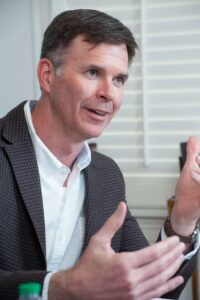
Chief Experience Officer and financial advisor, Sound Financial Strategies Group, Flowood. Married to Christie with three children. Member of Park Place Baptist Church in Pearl. Board member of Jackson Leadership Foundation.
Randy Mascagni
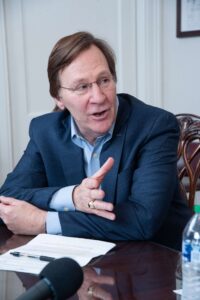
Founder and Certified Financial Planner, Mascagni Wealth Management, Clinton. Married to Vickie with two children and three grandchildren. Member of Morrison Heights Baptist Church in Clinton. Disciples young people at detention centers via The Baptist Children’s Village.
Ashley Sullivan
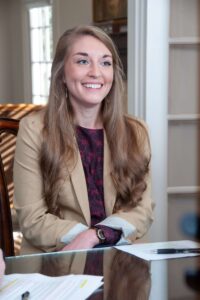
Senior Manager and Certified Public Accountant (CPA), BMSS Advisors and CPAs, Ridgeland. Engaged to Philip Herring. Member of First Baptist Church in Madison, where she teaches 12th-grade girls’ Sunday school. Member of the board of governors for the Mississippi Society of CPAs (MSCPA).
The interview
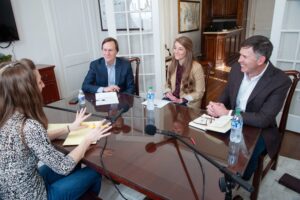
Katie Ginn: I’d love to hear where each of you grew up and what kind of relationship your family had with money.
Chris McAlpin: I grew up in Tupelo. My dad was a general contractor and my mom was a math teacher. One side of the family was entrepreneurs (who) were very loose and free with money. The other side had a scarcity mentality.
They were all Christians. Tithing, saving, being debt-free, those were all good things. But I’ve spent a lot of my adult life unwinding my own mistakes.
Randy Mascagni: I grew up in Natchez. My father was a small business owner. I’d say we were a middle-income family.
My grandparents lived five miles away, and I would say they were the most influential people in my life, in terms of Christian stewardship. We were cleaning out their house years later and found out that my grandmother used the envelope system. She had an envelope labeled ‘church,’ one for medical …
All of (my family) were Christians, and they all went to church. My grandfather was a barber, and I watched him run his business.
Ashley Sullivan: I grew up in Madison. My dad is a civil engineer with the Mississippi Department of Transportation (MDOT). My mom worked full time till my brother was born, and then she stayed home with us. We were middle income.
I saw my mom balance the checkbook every month by hand. They gave faithfully to the church.
My grandparents had a store in Belden, but they had to get out of the business. The post office rented the building from them, and my grandfather became a postmaster.
I think I’m a little, like my grandfather would say, ‘stingy’ – I like to save, not just spend.
KG: How did each of you become interested in the financial field?
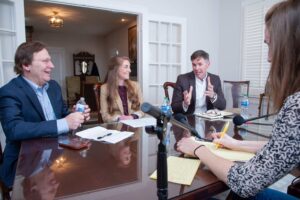
CM: In college I majored in accounting, and I was not very good at it. Then I got a job as a stockbroker’s assistant after my freshman year … and somehow I was good at it.
As the Lord reshaped my life in my 20s, I developed a passion for really helping people. At first, (working in the financial field) was just this sexy, cool thing. But then it became substantial.
AS: My dad always told me and my brother we had an engineering mind. (But) my mom majored in business … and she said, ‘You need to take accounting.’ I took an accounting class in high school, and I got it – and I realized, you either get it, or you don’t. (laughter all around) I went to Mississippi State and majored in accounting.
I interned at a firm in Memphis, and I was able to see both audit and tax. I felt like with tax, I was still doing the puzzle of accounting every day, which is what I love about it.
RM: My father passed suddenly. Due to a lack of planning on his part, I had to step up … My roommate was an attorney, and he helped me find a stockbroker to help manage my father’s investments.
Over the next eight or nine years, I started investing, and I absolutely loved it.
I took a look at becoming a Certified Financial Planner. Then I started my own business.
KG: Could each of you explain what you do on a day-to-day basis?

CM: My core job as a financial advisor is taking a client and developing a financial plan for them. This is your plan to reach your goals. What do you want to accomplish?
But I spend an awful lot of time helping people manage their plans.
AS: I spend most of my day to day preparing tax returns. I have a lot of contact with the (Mississippi) Secretary of State’s office. I’ll get questions from clients about tax law and how to save the most on their taxes.
KG: And you’re in busy season now, right?
AS: Yes. My boss calls it ‘success season.’ (laughs) We’ll be pretty busy through April 15 …
Toward the end, I’ll be working 82 to 83 hours a week. But not the whole time.
RM: My average day, assuming we’ve already met with a client and developed a plan … We may be buying – we’re certainly not traders – or we may be on the phone talking with a client.
We’re having times now where we’re settling estates and passing it on.
KG: Have you had second-generation clients?
RM: Yes, we have. It’s a great thing when it works. When the next generation is included in a multi-generational financial plan, then there is a vision and plan to leverage the benefits for all family members.
KG: What is the biggest mindset shift y’all have had to make, in terms of handling finances from a Christian perspective?
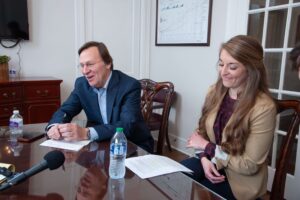
RM: When we first got married, (my wife) had tithed and I had not. We joined a young couples’ class at church, and the teachers poured time into us. Through time and tithing and giving, I came to see that God’s economy is totally different than the world’s economy.
He allows us to be a steward of (money).
AS: Our ability to work is a gift from the Lord – so that money isn’t ours to begin with.
The way we handle our finances is a direct reflection of how appreciative we are of what He’s given us.
My church sent out an email this week, and it was saying how we need to appreciate the Blesser, and not just seek out the blessings He gives us. I thought that was cool since I was preparing for this interview this week.
I teach youth Sunday school too, and right now we’re in Genesis. Adam was called by God to work before sin. So work is a good thing.
CM: My biggest financial regret is that I adopted the scarcity mentality of my family pretty strongly. It was a stressor in my career to make people profitable while I had that scarcity mentality. But as I studied the Bible (I saw) God created us to be productive and creative. He created us to be ambitious.
We should also be content. … Over half of the U.S. population ranks in the top 10 percent wealth bracket worldwide. (God says He) will make you rich so you’ll be generous. (We are to) live this life full and free in Christ, and your money has something to do with that.
For those of us who touch money all the time, one of the biggest struggles is, we see people’s love of money.
RM: And dependence.
KG: How does your mindset as a believer impact the way you interact with clients – especially if they don’t share your mindset? Is it hard not to overstep your bounds?

CM: Depending on where that person’s coming from, I try to meet them where they are. I try to be patient but truthful. If I ever say, ‘If I have to sugarcoat, I can’t do my job very well,’ I’m about to tell you something pretty bad.
We wind up talking about death, and eternity, and then taxes, and it all gets jumbled up, and we’re more comfortable with that than they are. I see it as a ministry in the job.
AS: There’s planning involved for business owners: Should I buy this equipment this year, or next year? There are definitely ethics that come into it. Some of it’s black and white, some of it can get gray, and some (clients) want to push it. I have not been directly involved in these situations, (but) we as CPAs are bound by the ethical standards set by the state boards and AICPA (American Institute of Certified Public Accountants).
RM: A few years ago, Congress enacted a law where clients can send an RMD (required minimum distribution) directly to their church. At age 73, they have to start taking a minimum amount out of their retirement account, and it’s taxed. But for some, if it’s given directly to the charity or church, there are some additional tax savings.
So that opens the door to talk a little bit about charitable donations (and) stewardship.
New clients are fairly savvy, and many have done their homework and know what you’re like before they walk in. If they don’t want to discuss (biblical stewardship), they’ll go elsewhere.
KG: What are the biggest misconceptions people have about what y’all do, or about finances in general?

RM: A lot of people still don’t know what a financial planner does. Once they get involved and are matched with the right advisor (or planner), they can get some really good advice. Some stuff you can get online, a lot you can’t.
CM: A lot of people still believe they can go get rich in the stock market. You can grow and maintain wealth, but it’s your skillset, your money management or lack thereof. (Getting rich quick) is not for 99 percent of the world. We work on building slow, steady, long-term wealth.
If you get it fast, you’d better know what you’re doing.
AS: People think a CPA is just a bean counter. But there is more of a planning side, and research. There’s a lot of tax law to get through. … I took three or four law classes in college.
KG: What is the biggest challenge in each of your jobs?
RM: For me, it’s during major market declines – keeping clients focused. We don’t see many derail. If one does, that’s one too many. Some worry more than others.
And I want to see them get back in the black ASAP.
CM: I think also the emotions people bring to the table: fear of missing out, which is greed, fear of loss. We all have them, and we all deal with them differently.
I tell young advisors, you’d better get real comfortable with the ups and downs of the market.
AS: I’m in a very deadline-driven profession. (But) it’s a job. I have to remember that’s not who I am or where I find my identity – but still put forth my best effort. That’s hard (to balance) when you’re putting in so many hours.
KG: What is the biggest blessing you find in each of your jobs?
RM: My clients: spending time with them, talking with them, doing life with them … crying with them, being happy with them … We go to funerals, and we go to weddings.
If I go through a period of time where I haven’t spent some time with a client in a few weeks, it affects me.
AS: One of my favorite things is training the newer staff and interns, and seeing the lightbulb go off … being the person that people come to and close the door so they can ask a question.
CM: I love our clients. I love to see them successful – not just in their net worth but in how they’re flowing through life. (I love) to be able to teach others a biblical mindset and they get it.
KG: Any tips for exercising self-control when it comes to money?
CM: Look, on (my wife and I’s) first date, they declined my debit card. I had no discipline. (laughs)
RM: What we have found is to set up (auto-drafts going to savings) on a regular basis … set up some structure, and usually people will live within those parameters.
As people get into studying God’s Word about stewardship, you see tremendous change.
AS: My fiance loves Dave Ramsey. So we’ve already gone through Financial Peace University. We both have a 401K and Roth IRA. I think we both grew up with a stingy mindset.
We’re using the EveryDollar app. I’ve never stuck with a budget, but I know what I make and what comes out. Church and savings are non-negotiable.
CM: I set rules for myself. … I recognize what works well for me.
If you tithe, save and invest, you will grow wealth. Tithe, save, and live off the rest. It does not have to be complicated.
Financial resources for 2024
Advertiser spotlight
Southern AgCredit
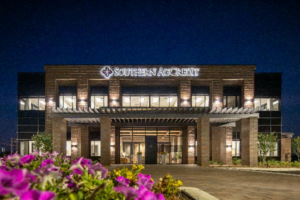
Southern AgCredit is a full service, locally owned cooperative lender that specializes in financing land. This land is often used for agriculture, such as crop, cattle and poultry farming, as well as timberland and other uses related to agribusiness and recreation. Likewise, we often finance land improvements as well as country homes, farm structures, equipment and vehicles, poultry houses and agricultural equipment.
But our expertise doesn’t stop there. We also make loans for rural hunting and fishing camps, country homesteads and a wide variety of rural investment property. So if you’ve always dreamed of owning a quiet piece of rural real estate — you’ve come to the right place!
Community Bank
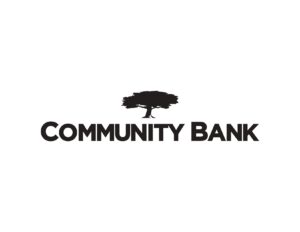
Community Bank, who today has $4.8 billion in assets with 54 offices and nearly 900 staff members across Mississippi, Alabama, Florida and Tennessee, has deep traditions when it comes to culture and how they do business. A consistent priority of doing things the right way – scripture on their marquees, a live person answering the phone each time you call, and a personal relationship with your banker have all been defining factors in Community Bank’s success for nearly 120 years. Their philosophy of putting the highest value on taking care of customers, no matter the relationship size, and making their communities better places to live and work has ensured Community Bank is built to last.
Citizens National Bank
Citizens National Bank is dedicated to assisting their customers in managing their finances wisely. With a strong commitment to financial education and empowerment, the bank offers a range of services and resources designed to help customers make informed decisions about their money. Whether it’s providing expert advice on savings and investments, offering user-friendly digital banking tools, or conducting financial literacy workshops, Citizens National Bank strives to empower individuals, families and businesses to achieve their financial goals. Our vision is that “every client has a financial plan to achieve their earthly dreams.” We are committed to providing our community with the knowledge and tools they need to make sound financial choices through local bankers who care. That’s the Power of Local.
Mississippi Baptist Foundation

In both the present and the future, generosity and a willingness to share should characterize the actions and attitude of genuine followers of Jesus Christ (1 Timothy 6:17-19). While generosity often tends to focus on the here and now, many people may not have considered how stewardship decisions in the present can yield continued blessings even after the Lord has called them into “higher service” with Him. Through your last will and testament, a scholarship or mission endowment, a charitable trust, or a gift annuity, the Mississippi Baptist Foundation can help you provide for both your kids and the Kingdom… your family and faith… as you experience “life that is truly life” (v. 19). See our ad on page xx.
John Dorsa State Farm
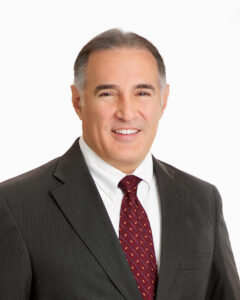
All insurance policies are not the same, and all insurance companies are not the same. VALUE means finding the BEST COVERAGE available at the BEST PRICE available; the purpose for insurance is to protect your property and assets, so finding the best VALUE should be everyone’s goal when shopping for insurance (not fishing for the cheapest price).
In June 2022, State Farm celebrated our 100-year anniversary. If disaster strikes, State Farm WILL BE HERE for you when you need us. And why do you need a local agent? Because we are here to fight for YOU! With John Dorsa State Farm, you are not a number: You are a unique person, with a unique situation and unique needs, and you are a part of our family.

